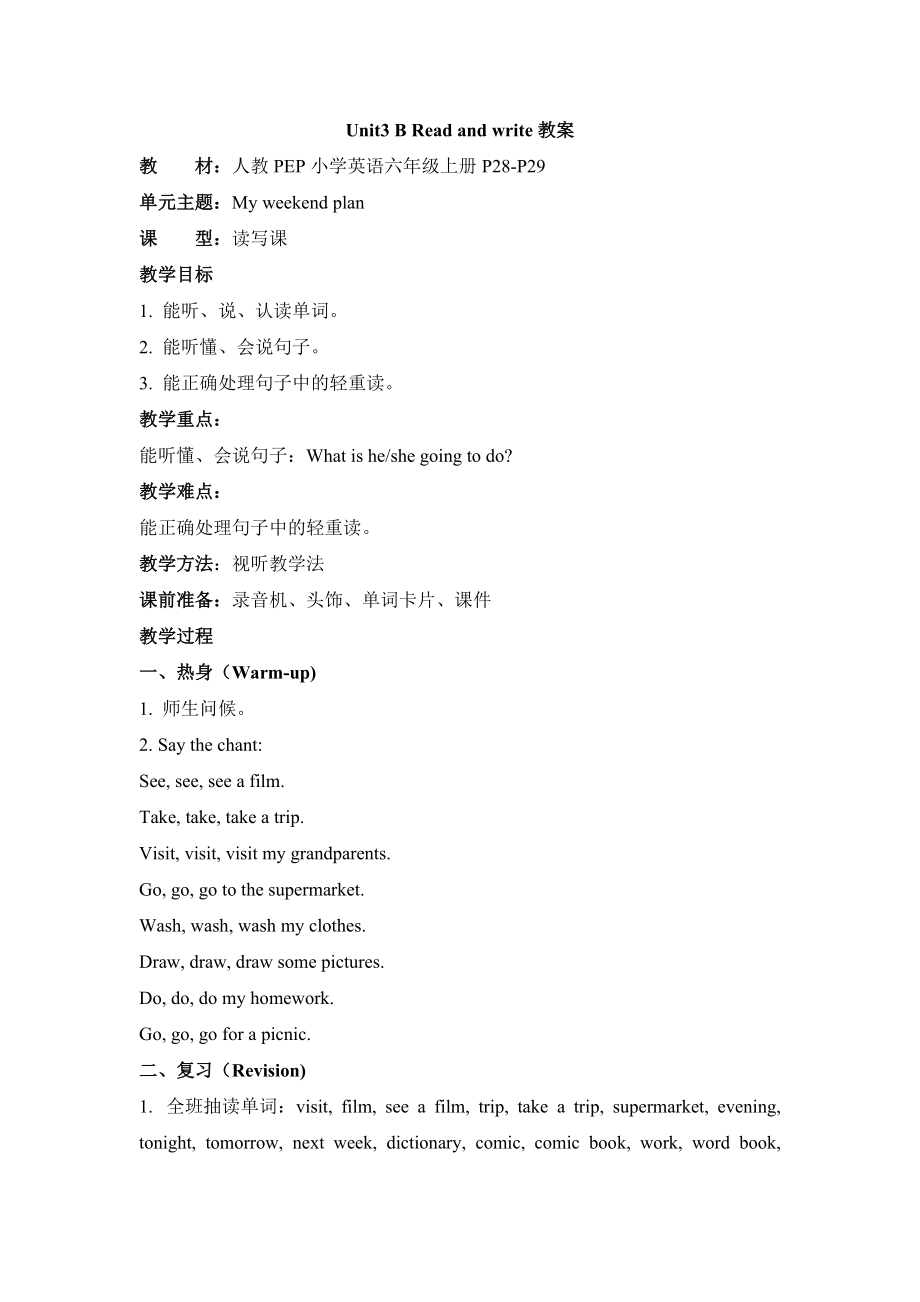《六年級(jí)上冊(cè)英語教案Unit 3 My weekend plan B Read and write 人教》由會(huì)員分享�,可在線閱讀,更多相關(guān)《六年級(jí)上冊(cè)英語教案Unit 3 My weekend plan B Read and write 人教(4頁珍藏版)》請(qǐng)?jiān)谘b配圖網(wǎng)上搜索��。
1���、Unit3 B Read and write教案
教 材:人教PEP小學(xué)英語六年級(jí)上冊(cè)P28-P29
單元主題:My weekend plan
課 型:讀寫課
教學(xué)目標(biāo)
1. 能聽��、說����、認(rèn)讀單詞�����。
2. 能聽懂、會(huì)說句子����。
3. 能正確處理句子中的輕重讀。
教學(xué)重點(diǎn):
能聽懂����、會(huì)說句子:What is he/she going to do?
教學(xué)難點(diǎn):
能正確處理句子中的輕重讀。
教學(xué)方法:視聽教學(xué)法
課前準(zhǔn)備:錄音機(jī)����、頭飾、單詞卡片����、課件
教學(xué)過程
一、熱身(Warm-up)
1. 師生問候����。
2. Say the chant:
2、
See, see, see a film.
Take, take, take a trip.
Visit, visit, visit my grandparents.
Go, go, go to the supermarket.
Wash, wash, wash my clothes.
Draw, draw, draw some pictures.
Do, do, do my homework.
Go, go, go for a picnic.
二��、復(fù)習(xí)(Revision)
1. 全班抽讀單詞:visit, film, see a f
3�����、ilm, trip, take a trip, supermarket, evening, tonight, tomorrow, next week, dictionary, comic, comic book, work, word book, postcard。
2. 活動(dòng):Make a shopping plan
活動(dòng)方式:學(xué)生根據(jù)教師的提示��,擬定一份“周末購物計(jì)劃”�����,并把它寫下來�����,最后請(qǐng)上一些學(xué)生來介紹他們的“周末購物計(jì)劃”����。
教師提示如下:
When are you going?
Where are you going?
How are you going there?
4�、
What are you going to buy?
…
三、新課呈現(xiàn)(Presentation)
1. 教學(xué)單詞或詞組:Mid-Autumn Festival, moon, mooncake
1) 教師在黑板上畫一個(gè)月亮����,問:What’s this? 學(xué)生回答后,教師板書:moon,帶讀moon�。
2) 出示月餅的圖片,并介紹:This is a cake. It looks like the moon. We call it “moon cake”. 板書:mooncake, 學(xué)生邊傳月餅圖片邊說“mooncake”����。
3) T: When do you us
5����、ually eat the mooncakes?
Ss: 中秋節(jié)��。
T: Yes. It’s Mid-Autumn Festival.
教師板書:Mid-Autumn Festival并帶讀����。
2. 教學(xué)單詞或詞組:poem, together, get together
1) 教師出示本課的詩歌介紹:This is a poem. It’s very beautiful. Let’s read it together. OK? 讓學(xué)生試讀這首詩,體會(huì)詩歌的韻律�。
2) 教師板書:poem, together, get together, 解釋“get together”
6、的意思是“聚會(huì)”���,帶讀:poem, together, get together�����。
3. 教學(xué)B. Read and write
1) 教師播放教學(xué)視頻���,學(xué)生看視頻理解課文內(nèi)容。
2) 學(xué)生閱讀課文��,填寫表格���。
3) 全班校對(duì)表格����。
4) 教師再次播放視頻,每句后暫停�����,全班跟讀�。
5) Discuss with your partner. What are you going to do for Mid-Autumn Festival? Write down your plan.
A. For Mid-Autumn Festival, I’m going to …
B.
7����、 My partner is going to …
全班學(xué)生兩人一組進(jìn)行交流,并在各自的課本上寫下計(jì)劃�����,然后請(qǐng)一些學(xué)生進(jìn)行全班交流��。
4. 教學(xué)B. Tips for pronunciation
教師讓學(xué)生翻開課本����,試讀這些單詞,告訴學(xué)生這些都是多音節(jié)詞��,提醒學(xué)生注意教材中標(biāo)注的重讀音節(jié)���。然后播放錄音�,學(xué)生邊聽邊跟讀。
四���、鞏固與拓展(Consolidation and extension)
活動(dòng):溫馨的節(jié)日
活動(dòng)方式:教師提供一些節(jié)日?qǐng)鼍?���,學(xué)生兩人一組�����,選定一個(gè)節(jié)日?qǐng)鼍?�,模擬“小記者”對(duì)同桌進(jìn)行采訪��。
教師提供的場(chǎng)景如:Children’s Day, Mother’s D
8�、ay, Teachers’ Day��。
對(duì)話內(nèi)容如:
Little reporter: Tomorrow is Mother’s Day. What are you going to do?
S: I’m going to send a card for my mum.
Little reporter: Are you going to buy one?
S: No, I’m going to draw at school.
Little reporter: Are you going to do housework for your mum?
S: Yes,
9����、 I’m going to clean the room and wash the clothes.
Little reporter: What a nice child!
五�、作業(yè)(Homework)
“教書先生”恐怕是市井百姓最為熟悉的一種稱呼�����,從最初的門館����、私塾到晚清的學(xué)堂��,“教書先生”那一行當(dāng)怎么說也算是讓國人景仰甚或敬畏的一種社會(huì)職業(yè)��。只是更早的“先生”概念并非源于教書�,最初出現(xiàn)的“先生”一詞也并非有傳授知識(shí)那般的含義�����?����!睹献印分械摹跋壬螢槌龃搜砸玻俊?���;《論語》中的“有酒食,先生饌”���;《國策》中的“先生坐�,何至于此�����?”等等�,均指“先生”為父兄或有學(xué)問、有德行的長(zhǎng)
10��、輩�。其實(shí)《國策》中本身就有“先生長(zhǎng)者����,有德之稱”的說法���?����?梢姟跋壬敝夥钦嬲摹敖處煛敝?��,倒是與當(dāng)今“先生”的稱呼更接近����?�?磥?�,“先生”之本源含義在于禮貌和尊稱,并非具學(xué)問者的專稱�。稱“老師”為“先生”的記載����,首見于《禮記?曲禮》���,有“從于先生,不越禮而與人言”,其中之“先生”意為“年長(zhǎng)��、資深之傳授知識(shí)者”�����,與教師、老師之意基本一致�。1. 聽錄音,跟讀課文��。
要練說�����,得練看�����?����?磁c說是統(tǒng)一的,看不準(zhǔn)就難以說得好����。練看,就是訓(xùn)練幼兒的觀察能力��,擴(kuò)大幼兒的認(rèn)知范圍�,讓幼兒在觀察事物、觀察生活���、觀察自然的活動(dòng)中���,積累詞匯、理解詞義���、發(fā)展語言�。在運(yùn)用觀察法組織活動(dòng)時(shí)�����,我著眼觀察于觀察對(duì)象的選擇�,著力于觀察過程的指導(dǎo),著重于幼兒觀察能力和語言表達(dá)能力的提高。2. 完成活動(dòng)手冊(cè)配套練習(xí)���。
3. 與家人一起制定周末旅行或購物計(jì)劃。
六�、板書設(shè)計(jì)
Unit3 My weekend plan
What are Wu Yifan’s family going to do?
What are you going to do?
 六年級(jí)上冊(cè)英語教案Unit 3 My weekend plan B Read and write 人教
六年級(jí)上冊(cè)英語教案Unit 3 My weekend plan B Read and write 人教

